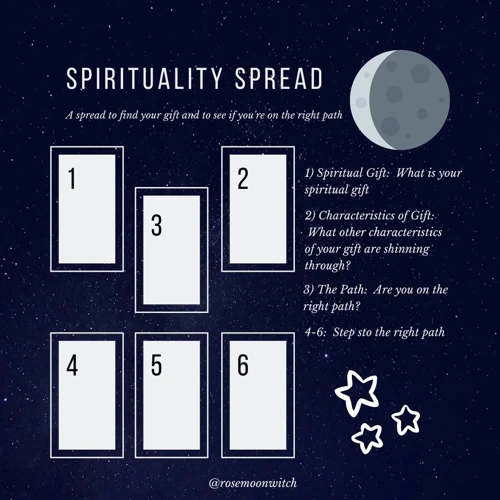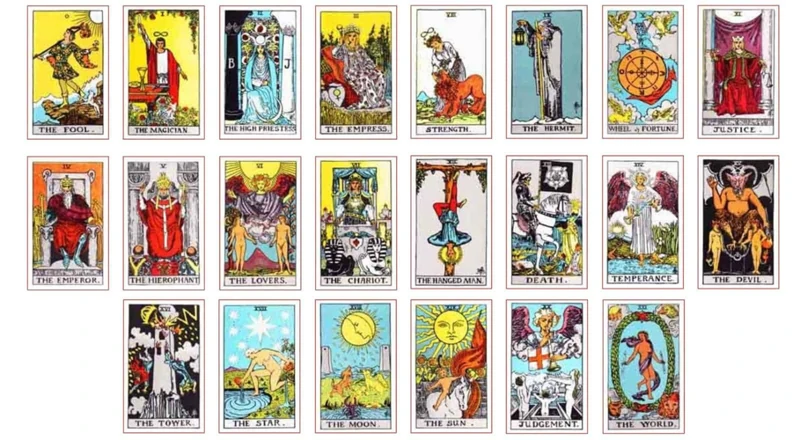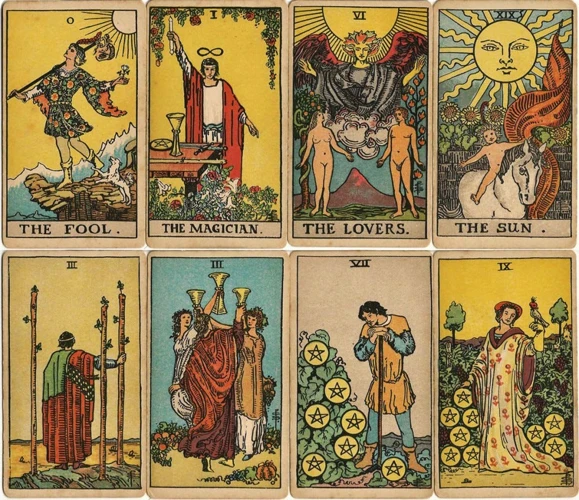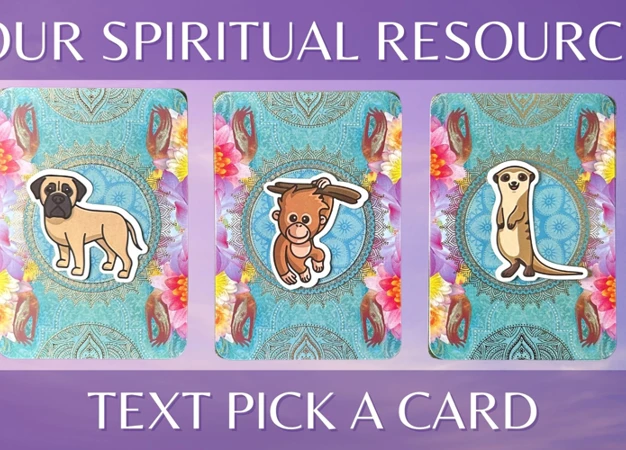Choosing a Tarot Deck That Reflects Your Spirituality: A Guide to Finding the Perfect Deck for You
Contents
- Understanding Your Spirituality
- Types of Tarot Decks
- Symbolism and Imagery
- Connecting with the Deck
- Conclusion
-
Frequently Asked Questions
- 1. Can I use any tarot deck for my spiritual practice?
- 2. What is the significance of the Rider-Waite-Smith Tarot deck?
- 3. How does the Thoth Tarot differ from other tarot decks?
- 4. What is the Tarot de Marseille known for?
- 5. What are Oracle Decks?
- 6. How do astrology and elemental associations play a role in tarot decks?
- 7. What are archetypes, and why are they important in tarot decks?
- 8. How can I determine if I have a personal connection with a tarot deck?
- 9. What does it mean to have energetic alignment with a tarot deck?
- 10. Can I interpret tarot cards in my own unique way?
- References
Understanding Your Spirituality

When it comes to choosing a tarot deck, it’s essential to have a clear understanding of your spirituality. Your spiritual beliefs and practices play a significant role in determining the type of tarot deck that will resonate with you on a deeper level. Take the time to reflect on your beliefs, values, and the aspects of spirituality that are most important to you. This self-reflection will help guide you in selecting a deck that aligns with your unique spiritual path.
One way to define your spiritual beliefs is by examining the various paths available. Research different spiritual traditions such as Wicca, Buddhism, or Hinduism, and explore the core tenets, philosophies, and practices associated with each. This exploration can offer valuable insights into the elements that resonate with you the most.
Identifying core elements of your spirituality is crucial in choosing a tarot deck. Consider the symbolism, imagery, and themes that hold personal significance for you. For example, if you are drawn to nature and the cycles of the seasons, a deck with strong elemental associations may be a good fit. Alternatively, if you connect deeply with a specific archetypal figure or mythological story, choose a deck that incorporates these elements in its artwork.
Remember, your spiritual journey is unique to you, and it’s important to choose a tarot deck that reflects and supports your personal beliefs. Don’t be swayed by popular trends or the influence of tarot deck publishers. Trust your inner guidance and intuition when making this decision. By understanding your spirituality, exploring different paths, and identifying core elements, you’ll be well on your way to finding a tarot deck that resonates with your soul.
Defining Your Spiritual Beliefs
Defining your spiritual beliefs is the first step in choosing a tarot deck that aligns with your personal journey. It’s a process of self-reflection and exploration, allowing you to gain clarity on what spirituality means to you. Here are some considerations to help define your spiritual beliefs:
- Reflect on your personal experiences: Think about moments in your life that have deeply impacted you, whether they be joyful, challenging, or transformative. These experiences can provide insights into your spiritual inclinations and what you hold sacred.
- Explore different philosophies and belief systems: Engage in research and readings on different spiritual paths, such as Buddhism, Native American spirituality, or esoteric traditions. This exploration can expand your awareness of the diverse spiritual beliefs and philosophies in the world.
- Consider your values and principles: What are the core values that guide your life? Are you drawn to principles of compassion, environmental stewardship, or personal growth? Identifying these values can help you align with a tarot deck that resonates with your moral and ethical principles.
- Examine your connection with divinity: Whether you identify as religious, agnostic, or spiritual, reflect on your relationship with the divine. How do you perceive or experience the higher power or universal energies? Your connection with the divine can influence the symbolism and imagery you seek in a tarot deck.
- Embrace personalization: Remember that your spiritual beliefs are unique to you, and you have the freedom to personalize your tarot deck. Whether through customization, card selection, or artistic modifications, make the deck truly reflect your spiritual beliefs and practices. [1]
By taking the time to define your spiritual beliefs, you’ll gain invaluable insights into the type of tarot deck that will resonate with your soul. Avoid being swayed by external influences, such as tarot deck publishers, and trust your inner guidance as you embark on this spiritual journey.
Exploring Different Paths
When it comes to exploring different paths in spirituality, it’s important to approach it with an open mind and willingness to learn. Each spiritual tradition offers unique insights and perspectives that can deepen your understanding of the world and your place in it.
One path to explore is Wicca, a contemporary pagan religious movement that honors nature and celebrates the cycles of the seasons. Wicca incorporates magical practices, and many Wiccan tarot decks are designed to align with these beliefs and rituals. These decks often feature imagery associated with the Wiccan Wheel of the Year, elemental symbols, and goddess and god archetypes.
Another spiritual path to consider is Buddhism, which emphasizes mindfulness, compassion, and the pursuit of enlightenment. Buddhist-inspired tarot decks may incorporate Buddhist symbolism, such as the lotus flower, the Eightfold Path, and representations of Buddhist deities like Avalokiteshvara or Tara.
If you are drawn to the rich mythology and Hindu philosophy, exploring Hinduism as a spiritual path can be enlightening. Hindu-inspired tarot decks may feature Hindu gods and goddesses, representations of chakras and energy centers, and symbols from ancient Hindu scriptures like the Bhagavad Gita or the Vedas.
Exploring these different paths can help you gain a broader perspective on spirituality and inform your choice in selecting a tarot deck. Remember, the goal is to find a deck that resonates with your unique spiritual beliefs and practices. By considering different traditions and their associated symbolism, you can find a tarot deck that truly reflects your spirituality.
Identifying Core Elements
When it comes to identifying core elements in a tarot deck that align with your spirituality, there are several factors to consider:
- Symbolism: Pay attention to the symbols used in the deck. Symbols have different meanings and associations across various spiritual traditions. Look for symbols that resonate with you on a deep level and hold personal significance. For example, a lotus flower may symbolize purity and enlightenment in Eastern philosophies like Buddhism.
- Imagery: Consider the images on the cards and how they evoke emotions and connections within you. Do you prefer realistic or abstract artwork? Are you drawn to colorful, vibrant images, or do you prefer something more subdued? The imagery should reflect your aesthetic preferences and resonate with your spiritual journey.
- Themes: Explore the themes present in the deck. Some decks focus on specific areas such as love, healing, or personal growth. Others may emphasize particular mythologies or spiritual concepts. For example, a deck inspired by Norse mythology may be more suitable for someone with an affinity for Scandinavian folklore.
By considering these core elements in a tarot deck, you can ensure that the deck you choose aligns with your spiritual beliefs and enhances your intuitive understanding of the cards. Remember to stay true to yourself and not be swayed by external influences, such as tarot deck publishers. Trust your instincts and select a deck that truly speaks to your soul.
Continue your journey of understanding tarot decks and their design by exploring different tarot deck designs available on the market. Each deck has its own unique style, and by exploring the variety of designs, you can uncover decks that resonate with your preferences and spiritual path. Discover more about exploring tarot deck designs and find the one that captures your heart and soul.
Types of Tarot Decks

The Rider-Waite-Smith Tarot is one of the most popular and widely recognized tarot decks available. Created by Arthur Edward Waite and illustrated by Pamela Colman Smith, this deck features iconic imagery and symbolism that has become the standard for modern tarot reading. The deck consists of 78 cards, divided into the Major Arcana and Minor Arcana, each with its own unique meaning and interpretation. The Rider-Waite-Smith Tarot is a great choice for beginners due to its accessibility and the abundance of resources available for learning and interpretation.
The Thoth Tarot, also known as the Crowley-Harris Thoth Tarot, was created by the legendary occultist Aleister Crowley and Lady Frieda Harris. This deck is deeply rooted in Crowley’s esoteric teachings and incorporates complex symbolism and astrological correspondences. The Thoth Tarot deviates from traditional tarot imagery, featuring vibrant and surreal artwork that invites deep exploration and introspection. It appeals to those with a penchant for metaphysical studies and a desire to delve into the mystical realms of tarot.
Tarot de Marseille is one of the oldest tarot decks in existence, with origins dating back to the 17th century. This traditional deck follows a distinct artistic style characterized by intricate line drawings and vibrant primary colors. The Tarot de Marseille consists of 78 cards, each depicting various archetypal figures and symbolic imagery. It is highly regarded for its simplicity and straightforwardness, making it a preferred choice for those who appreciate a more traditional approach to tarot reading.
Oracle decks differ from traditional tarot decks in that they don’t adhere to the standard structure and symbolism of tarot. These decks often have a specific theme or focus, such as angels, animals, or affirmations, and contain cards with intuitive messages or guidance. Oracle decks can be a wonderful tool for personal reflection and spiritual growth as they allow for more open interpretation and individualized meanings. They offer a broader range of creative expression and can be particularly appealing to those who prefer a more intuitive and free-form approach to divination.
Rider-Waite-Smith Tarot
- The Rider-Waite-Smith Tarot, also known as the RWS Tarot, is one of the most popular and widely used tarot decks in the world. Created by artist Pamela Colman Smith and published by the Rider Company, this deck revolutionized tarot design when it was first released in 1909.
- What sets the Rider-Waite-Smith Tarot apart is its rich symbolism and imagery. Each card tells a story through its detailed illustrations, making it easy for beginners to interpret and connect with the cards. The Major Arcana cards in particular are rich in archetypal symbolism, drawing from various spiritual traditions and mythologies.
- The deck’s vibrant and colorful artwork, combined with its intuitive symbolism, makes it an ideal choice for those who are new to tarot or are looking for a deck that aligns with traditional meanings. The RWS Tarot serves as a foundation for many modern tarot decks, influencing their design and interpretation.
- Whether you’re a beginner or an experienced tarot reader, the Rider-Waite-Smith Tarot can be a valuable tool for spiritual insight and self-reflection. Its enduring popularity and widespread use make it easy to find resources, books, and interpretations that can help deepen your understanding of the cards. However, it’s important to keep in mind that the influence of tarot deck publishers can impact the interpretations and artwork of the Rider-Waite-Smith Tarot and other decks.
Thoth Tarot
Thoth Tarot: Exploring the Mystical and Symbolic Deck
The Thoth Tarot is a deck steeped in mysticism and symbolism, created by Aleister Crowley and Lady Frieda Harris. It is based on the teachings of the Hermetic Order of the Golden Dawn and incorporates elements of Egyptian mythology, astrology, and Kabbalah. This deck is known for its intricate artwork and rich symbolism, making it a popular choice among experienced readers.
- Astrological Associations: One of the defining features of the Thoth Tarot is its strong connection to astrology. Each card is associated with a specific astrological sign, planet, or elemental energy. This allows for a deeper exploration of astrological correspondences and influences in tarot readings.
- Kabbalistic Influences: The deck also draws inspiration from Kabbalah, an esoteric and mystical tradition in Judaism. The Major Arcana cards in the Thoth Tarot incorporate Kabbalistic symbolism, such as the Tree of Life and the ten Sephiroth. This adds an extra layer of spiritual depth and insight to the readings.
- Symbolic Imagery: The artwork in the Thoth Tarot is highly detailed and rich in symbolism. Each card is filled with intricate imagery that can be interpreted on multiple levels. This allows for a more nuanced understanding of the messages and meanings contained within the deck.
- Mystical and Spiritual Exploration: Due to its complex symbolism and esoteric influences, the Thoth Tarot is particularly well-suited for those interested in deepening their spiritual and mystical journey. It encourages exploration and reflection on the mysteries of the universe and the interconnectedness of all things.
Whether you are an experienced tarot reader or a beginner seeking to delve into the mysteries of the Thoth Tarot, this deck offers a profound and transformative experience. Its unique blend of astrology, Kabbalah, and symbolism provides a rich tapestry of knowledge and insight for those willing to embark on a spiritual journey with the cards.
Tarot de Marseille
The Tarot de Marseille is one of the oldest and most influential tarot decks in existence. Its origins can be traced back to the 15th century in France. What sets the Tarot de Marseille apart is its distinctive artistic style and use of elemental associations.
This deck typically consists of 78 cards divided into major arcana and minor arcana. The major arcana cards depict powerful archetypal figures such as The Fool, The Magician, and The Empress. The minor arcana cards are divided into four suits: Wands, Cups, Swords, and Coins. Each suit represents a different element – fire, water, air, and earth respectively.
The Tarot de Marseille is known for its simple yet striking imagery. The cards feature bold, primary colors and sharp, geometric designs. This simplicity allows for a straightforward interpretation of the cards, making it a popular choice for traditional tarot readings.
When choosing a Tarot de Marseille deck, pay attention to the quality of the artwork and the level of detail. Look for a deck that resonates with you visually, as the imagery will greatly influence your connection with the deck during readings.
Remember that every individual has unique preferences, so take the time to explore different Tarot de Marseille decks or even variations within this style to find the one that speaks to you the most. The Tarot de Marseille offers a rich and historical approach to tarot readings, making it an excellent choice for those seeking a traditional and elegant tarot deck.
Oracle Decks
One type of tarot deck that you may consider when choosing a deck that reflects your spirituality is an oracle deck. Unlike traditional tarot decks, which typically have 78 cards, oracle decks can vary in size and number of cards. Oracle decks are known for their versatility and the wide range of themes and messages they offer.
Oracle decks are not bound by the traditional structure and symbolism of tarot decks. They often feature unique and diverse imagery, allowing for a more intuitive and flexible interpretation. These decks may focus on specific themes, such as angels, animals, crystals, or chakras, catering to individual spiritual interests and practices.
Oracle decks are a popular choice for those who prefer a more free-form approach to divination and spiritual guidance. Each card in an oracle deck carries its own distinct message and can be used independently or in combination with other cards. This allows for a more personalized and intuitive reading experience.
When selecting an oracle deck, consider the themes and imagery that resonate with your spirituality. Look for decks that align with your interests and areas of focus. Some oracle decks may have a specific cultural or spiritual influence, such as Celtic or Native American themes, while others may draw from a broader range of spiritual traditions.
Oracle decks can be a powerful tool for self-reflection and spiritual exploration. They offer a unique perspective and guidance that can deepen your connection to your spirituality. Whether you choose a traditional tarot deck or an oracle deck, finding one that resonates with your beliefs and speaks to your soul is essential in cultivating a meaningful and personal tarot practice.
Symbolism and Imagery

When choosing a tarot deck, it’s important to consider the symbolism and imagery used in the cards. Every tarot deck has its own unique artistic interpretations, and these symbols can greatly enhance your understanding and connection with the cards. Here are a few aspects to consider:
- Astrology and Elemental Associations: Many tarot decks incorporate astrological symbolism, associating each card with a specific zodiac sign, planet, or element. Understanding your personal connection with astrology and the elements can help guide you in finding a deck that aligns with your spiritual beliefs and interests.
- Archetypes and Mythology: Tarot decks often feature archetypal figures or mythological references, such as the fool, the high priestess, or ancient gods and goddesses. Reflect on the archetypes and mythologies that resonate with you and seek out decks that include these elements, as they can provide a deeper layer of meaning to your readings.
- Visual Style and Artistic Interpretation: Each tarot deck has its own artistic style and interpretation, whether it be bold and vibrant or soft and ethereal. Consider your personal aesthetic preferences and choose a deck that speaks to you visually. The artwork should evoke emotions and create an immersive experience during your tarot readings.
By carefully considering the symbolism and imagery used in tarot decks, you can choose a deck that resonates with your spirituality and enhances your connection with the cards. Remember, your tarot deck should be a tool that supports and reflects your individual spiritual journey.
Astrology and Elemental Associations
Astrology and elemental associations are crucial factors to consider when choosing a tarot deck that reflects your spirituality. Astrology, with its rich symbolism and connection to the celestial bodies, can greatly enhance the depth and accuracy of tarot readings. Each zodiac sign and planet holds its own energetic qualities and traits. Aligning these astrological correspondences with the tarot can provide a powerful and personalized reading experience.
One way to incorporate astrology into your tarot deck selection is by looking for decks that include astrological symbols and references in their artwork. These decks often assign specific cards to the zodiac signs or planets, allowing you to explore their meanings and connections during your readings. Some tarot decks even have entire spreads or layouts dedicated to astrological readings, enabling you to dive deeper into the cosmic influences at play.
Elemental associations are another important aspect to consider. The four elements – earth, air, fire, and water – each have their own energies and characteristics that can greatly impact your spiritual journey. Some tarot decks are specifically designed to align with these elements, with corresponding cards and imagery that reflect their symbolism.
For example, a deck with a strong emphasis on the earth element may include cards that represent stability, practicality, and abundance. On the other hand, a deck that leans towards the air element might focus on intellect, communication, and new ideas. By understanding the elemental associations that resonate with you, you can choose a tarot deck that helps you connect with these energies and gain deeper insight into your spirituality.
Astrology and elemental associations offer valuable tools for personalizing your tarot experience and deepening your spiritual connection. Whether you’re drawn to the celestial influences of astrology or the elemental energies of earth, air, fire, and water, understanding these associations can help you select a tarot deck that aligns with your unique spiritual path and enhances your tarot readings.
Archetypes and Mythology
Archetypes and mythology are integral components of many tarot decks and can greatly impact your connection and interpretation of the cards. Archetypes are universal symbols and patterns that are deeply ingrained in the human psyche. By understanding the archetypes present in a tarot deck, you can gain insight into your own subconscious mind and tap into the collective wisdom they represent.
Mythology, on the other hand, is the study of traditional stories and legends that often involve gods, goddesses, and mythical creatures. Tarot decks often draw inspiration from various mythologies to create powerful imagery and symbolism. These mythological references can add depth and meaning to your tarot readings, allowing you to explore ancient narratives and connect with the timeless wisdom they contain.
When choosing a tarot deck, consider which archetypes and mythologies resonate with you the most. Are you drawn to the powerful and dynamic qualities of mythological gods and goddesses? Or do you find solace in the stories of mystical creatures and magical realms? By exploring tarot decks that incorporate archetypes and mythological themes that align with your spirituality, you can deepen your connection to the cards and enhance your tarot practice.
It’s important to note that different tarot decks may emphasize different archetypes and mythologies. For example, some decks may focus on Greek mythology, while others may draw from Celtic folklore or Egyptian deities. Take the time to research and familiarize yourself with the specific archetypes and mythological references present in the decks you’re considering, ensuring that they resonate with your spiritual journey and personal interests.
Visual Style and Artistic Interpretation
When choosing a tarot deck, one important consideration is the visual style and artistic interpretation. Tarot decks come in a wide range of artistic styles, from classic and traditional to modern and abstract. This visual aspect of the deck plays a significant role in how you connect with the cards and their symbolism.
If you appreciate classical art and have a fondness for Renaissance-era paintings, you might be drawn to a tarot deck that features intricate and detailed artwork reminiscent of this period. On the other hand, if you prefer a more contemporary and minimalist aesthetic, a deck with simple, clean lines and bold colors might better suit your taste.
Consider the artistic interpretation of the tarot symbols and imagery. Some decks stay true to the traditional symbolism found in the Rider-Waite-Smith tarot, while others offer unique interpretations that incorporate different cultural or mythological influences. For example, a deck that draws heavily on ancient Egyptian symbolism may resonate with you if you have a passion for Egyptian history and spirituality.
It’s also important to consider the overall vibe and mood that the deck evokes. Some decks have a lighthearted and whimsical feel, perfect for those who enjoy a more playful approach to tarot reading. Others have a darker and more mysterious aura, appealing to those who are drawn to the occult and esoteric aspects of tarot. Finding a deck that aligns with your preferred visual style and artistic interpretation will enhance your connection with the cards and deepen your spiritual practice.
Connecting with the Deck
Connecting with your tarot deck is a deeply personal and intuitive process. Once you have chosen a deck that aligns with your spirituality, it’s important to foster a strong connection with the cards. Trusting your gut feeling and intuition is paramount when working with tarot.
One way to connect with your deck is to hold each card in your hands and observe the sensations or emotions that arise. Pay attention to any intuitive insights or messages that come through. This hands-on approach allows you to establish a physical and energetic connection with the deck, enhancing your ability to interpret the cards.
Energetic alignment is another vital aspect of connecting with your tarot deck. Before each reading, take a moment to center yourself and set the intention of aligning your energy with the deck. You can do this by holding the deck close to your heart, taking a few deep breaths, and visualizing a harmonious energetic exchange between yourself and the cards.
Personal connection and interpretation play a significant role in developing a strong bond with your tarot deck. Allow yourself to explore the imagery, symbolism, and messages within the cards from your unique perspective. Trust your own interpretations and insights, even if they differ from traditional interpretations. Remember, tarot is a tool for self-reflection and personal growth, and your connection with the cards is deeply personal.
By connecting with your chosen tarot deck on an intuitive and energetic level, you enhance your ability to receive guidance, insights, and wisdom from the cards. Trust the process, be open to the messages that come through, and embrace the connection you develop with your tarot deck.
Gut Feeling and Intuition
Gut feeling and intuition play a crucial role in selecting a tarot deck that aligns with your spirituality. As you explore different tarot decks, pay attention to how your body and emotions respond to each one. Trust your instincts and listen to the messages that your intuition is sending you.
One way to tap into your intuition is by holding the tarot decks in your hands. Notice the sensations you feel when you touch the cards. Do they feel warm and comforting, or do they give you a sense of unease? Trust your body’s response to guide you towards the right deck.
Another way to connect with your intuition is by looking at the artwork and imagery of the tarot deck. Notice which cards immediately capture your attention and stir something within you. Pay attention to any emotional or physical reactions you have to specific images or symbols. Trust that your intuition is guiding you towards the images that hold deeper meaning for you.
Keep in mind that there is no right or wrong when it comes to choosing a tarot deck based on intuition. Each person’s intuitive guidance is unique, and what resonates with one person may not resonate with another. Trust yourself and choose the deck that feels right to you, even if it goes against popular opinion or expectations.
Ultimately, your gut feeling and intuition are powerful tools that can guide you in choosing a tarot deck that truly reflects your spirituality. Listen to these inner whispers and let them lead you towards a deck that speaks to your soul.
Energetic Alignment
Energetic alignment is a crucial aspect of connecting with a tarot deck on a deeper level. Each tarot deck has its own energy and vibration, and it’s essential to find a deck that resonates with your energetic field. One way to assess energetic alignment is to hold the deck in your hands and tune in to how it feels. Pay attention to any sensations, such as tingling or warmth, that you may experience.
Another way to determine energetic alignment is to shuffle the deck and observe your emotional response. Notice if the deck evokes any specific emotions, whether they are positive or negative. Your intuition will guide you towards the deck that feels energetically harmonious and supportive to you. Trust your gut feeling, as it is a powerful tool in recognizing energetic resonance.
Additionally, consider the imagery and symbolism used in the deck. Does it resonate with your personal energy and aesthetics? Do the images evoke a sense of familiarity or connection? Visualize yourself working with the deck, and pay attention to your emotional and energetic response. If the imagery feels aligned with your energy and sparks inspiration, it’s a good indication that the deck is a good match for you.
Remember that energetic alignment is a personal and subjective experience. What resonates with one person may not resonate with another. Trust yourself and your intuition when assessing energetic alignment. By choosing a deck that aligns with your unique energy, you create a powerful connection that enhances your tarot practice and spiritual journey.
Personal Connection and Interpretation
One of the most crucial aspects of choosing a tarot deck that reflects your spirituality is establishing a personal connection and interpretation with the cards. Each tarot deck has its own unique energy and symbolism, and it’s important to find a deck that resonates with you on a deep and personal level.
When selecting a tarot deck, pay attention to the initial gut feeling you have when you hold the cards. Trust your intuition and take note of any emotions, sensations, or thoughts that arise. This initial connection can indicate whether the deck is a good fit for you or not.
Consider the energetic alignment between you and the deck. Some tarot readers believe that each deck has its own energy and personality. Just as you would connect with another person, feel into the energy of the deck and see if it feels harmonious with your own vibration.
Interpretation is another essential aspect of personal connection. Look for a deck that aligns with your preferred method of interpretation. Some decks have detailed guidebooks that provide specific meanings for each card, while others encourage intuitive interpretation. Consider your own approach to tarot reading and choose a deck that supports and enhances your style of interpretation.
It’s important to note that the personal connection and interpretation with a tarot deck can deepen over time. As you spend more time working with the cards, you may develop a deeper understanding of the symbolism and gain insights that are unique to you. Trust your own interpretations and allow your connection to the deck to evolve and unfold naturally.
Conclusion
Choosing a tarot deck that reflects your spirituality is a deeply personal and meaningful decision. By understanding your spiritual beliefs, exploring different paths, and identifying core elements that hold significance for you, you can narrow down your options and find a deck that resonates with your soul. Keep in mind that there are various types of tarot decks available, such as the Rider-Waite-Smith Tarot, Thoth Tarot, Tarot de Marseille, and Oracle Decks. Each deck has its own unique symbolism, imagery, and artistic interpretation. Consider factors such as astrology and elemental associations, archetypes and mythology, and visual style when making your choice.
When connecting with a tarot deck, trust your gut feeling and intuition. Pay attention to how you energetically align with the deck and the messages it brings forth. Allow for a personal connection and interpretation, as it is your spiritual journey and relationship with the cards that matter most. Remember that there is no right or wrong deck, but rather the one that speaks to your heart and aligns with your spiritual path.
In conclusion, take the time to choose a tarot deck that resonates with your spirituality. Trust your instincts, explore different options, and connect with the deck on a deep and personal level. This will ensure that you have a powerful and transformative tool for self-reflection, guidance, and spiritual growth. Let the tarot deck be a reflection of your inner wisdom and spirituality, guiding you on your journey towards self-discovery and enlightenment.
Frequently Asked Questions
1. Can I use any tarot deck for my spiritual practice?
Yes, you can use any tarot deck that resonates with your spirituality. The key is to find a deck that aligns with your beliefs and speaks to you on a deep level.
2. What is the significance of the Rider-Waite-Smith Tarot deck?
The Rider-Waite-Smith Tarot deck is one of the most widely used and influential decks in tarot history. Its symbolism and imagery have become foundational in tarot reading and have inspired many other decks.
3. How does the Thoth Tarot differ from other tarot decks?
The Thoth Tarot, created by Aleister Crowley and Lady Frieda Harris, offers a unique and complex interpretation of the tarot. It delves into occult symbolism and incorporates elements of astrology and Egyptian mythology.
4. What is the Tarot de Marseille known for?
The Tarot de Marseille is a historic tarot deck that originated in France in the 18th century. It is recognized for its vibrant and intricate artwork and is often used for traditional divination purposes.
5. What are Oracle Decks?
Oracle decks are similar to tarot decks but do not adhere to the traditional structure of the tarot. They often contain a set of cards with messages or affirmations that can provide guidance and insight.
6. How do astrology and elemental associations play a role in tarot decks?
Astrology and elemental associations are commonly used in tarot decks to assign specific meanings and symbolism to each card. These associations can provide deeper insights and connections when interpreting the cards.
7. What are archetypes, and why are they important in tarot decks?
Archetypes are universal patterns or symbols that represent various aspects of human experience. They are essential in tarot decks as they tap into our collective unconscious and help us connect with the deeper meanings behind the cards.
8. How can I determine if I have a personal connection with a tarot deck?
One way to determine if you have a personal connection with a tarot deck is to spend some time holding and shuffling the cards. Pay attention to your feelings, intuition, and any messages or sensations you may receive. Trust your gut instinct to guide you.
9. What does it mean to have energetic alignment with a tarot deck?
Energetic alignment refers to the resonance and compatibility between you and a tarot deck. It means that the deck’s energy feels harmonious with your own, creating a stronger connection and facilitating more accurate readings.
10. Can I interpret tarot cards in my own unique way?
Absolutely! Interpreting tarot cards is a deeply personal process, and each individual brings their own experiences, intuition, and understanding to the table. Feel free to interpret the cards in a way that makes the most sense to you and reflects your spiritual beliefs.






